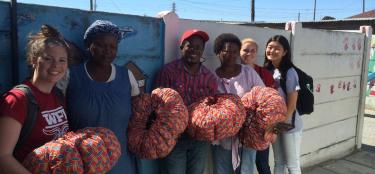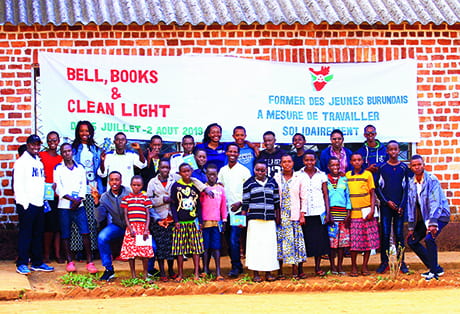Projects for Peace

Sponsored by the Davis United World College Scholars Program, Projects for Peace is an initiative for undergraduate students enrolled in a partner participating school, including WPI, to complete grassroots projects – anywhere in the world – to promote peace and build understanding.

What do we mean by projects for peace?
For the summer of 2022, undergraduate students from WPI are encouraged to use their creativity to design projects and employ innovative techniques for engaging project participants in ways that focus on conflict resolution, reconciliation, building understanding and breaking down barriers which cause conflict, and finding solutions for resolving conflict and maintaining peace. Pathways to peace can be conceived quite broadly, to include initiatives related to environment, education, or social services.
Projects will be selected for funding at $10,000 each.
Q&A about the Program
Get your questions answered and learn more about the program. For additional questions regarding COVID-19 and its impact on Projects for Peace, read the post here: Davis Projects for Peace Q&A
What does Projects for Peace hope to accomplish?
The goal is to encourage student initiative, innovation, and entrepreneurship focusing on conflict prevention, resolution, or reconciliation. Some of the most compelling projects to date have reflected one or more of the following characteristics: contributing to conflict prevention; fostering diplomacy or otherwise contribute to advancing peace processes underway; looking for and building on shared attributes among differing peoples, races, ethnicities, tribes, clans through art, sports, music, or other techniques to promote a common humanity; starting or leveraging initiatives, organizations (e.g. education, health) or infrastructure projects to build/rebuild community. In general, projects should be building blocks for a sustainable peace. The overall program is intended to be worldwide in scope and impact, but specific projects may be undertaken anywhere, including the U.S.
Who is funding this and why?
Projects for Peace was created in 2007 through the generosity of Kathryn W. Davis, a lifelong internationalist and philanthropist who died in 2013 at 106 years of age. She is the mother of Shelby M.C. Davis whose family funds the Davis UWC Scholars Program, currently involving 95 U.S. colleges and universities. Mrs. Davis’ legacy lives on through the continuation of Projects for Peace, sparking initiatives for building prospects for peace in the world. The Davis family and friends believe, like Mrs. Davis did, that today’s youth are tomorrow’s leaders who ought to be challenged to formulate and test their own ideas.
How does the funding for these projects work?
Davis philanthropy commits over $1 million each year to fund Projects for Peace. While Davis funding per project is limited to $10,000, projects with larger budgets are welcome with co-funding from other sources—such as other philanthropists, a college or university, foundation, NGO/PVO or students’ own fundraising.
Who is eligible to design a “Project for Peace”?
All undergraduate students including seniors who would complete their projects after graduation are eligible as long as the participation agreement from their institution has been fully executed.
How will the grants be awarded?
The intention is to fund 100 projects (or more, subject to additional funding), with at least one at each of the participating partner schools, including WPI. Therefore, WPI will select and submit one proposal for funding and one alternate proposal that might be funded as well. Final decisions on winning proposals are made by the Davis UWC Scholars Program office. Grant funds are made out to the participating partner schools, not to students, upon assurance that the project proposed will, in fact, be implemented during the summer of 2022 and once all Project Funding Agreements are received. It is the partner schools’ responsibility to distribute the awarded grant funds for the winning proposal within their policies and guidelines as it applies to grant awards to students.
Can students from different institutions collaborate on a project?
Yes. The Projects for Peace student proposer must be an undergrad at WPI but is free to collaborate with other students of her/his choice. Those teams can be comprised of other students WPI and/or students from other schools. When submitting a Projects for Peace proposal, the full team and their schools are to be listed but a WPI undergrad must be designated as the project lead and grant recipient.
Can two teams collaborate on one project to combine grant funds awarded?
No, two proposals for the same project are prohibited.
Is it possible to win a grants award for a second year for the same project?
No, it is not our policy to fund any Projects for Peace for a second year as we look to incubate, not sustain, projects.
How are the submitted proposals judged?
Each participating partner school has designated a campus contact, known as the Projects for Peace Liaison, to coordinate the Projects for Peace process on its campus. Professor Stephen McCauley (mccauley@wpi.edu) is the Liason for WPI. This PfP Liaison will guide the internal campus procedures within WPI’s policies and parameters: announcing and promoting the opportunity to students; organizing the selection committee to evaluate the proposals submitted; communicating results on a timely basis to the Davis UWC Scholars Program office; and distributing the awarded grant funds for the winning proposal(s) on campus. Final review and approval of all recommended proposals from individual campuses rests solely with the Davis UWC.
What is required for each project’s final report?
One final project report per project funded must be submitted to the Davis UWC Scholars Program office no later than September 13, 2022 via Dropbox (link to be requested by Projects for Peace Liaison from this office). Final Report Instructions are posted on our website and must be strictly adhered to or reports will be returned to conform to our instructions and formatting guidelines. All submitted and accepted final reports with pictures will be published on our Projects for Peace website and will be considered for profiling in our annual report. Final reports with pictures, once published, are not subject to further revisions nor be deleted for any reason.
Also see: Additional forms to fill out for the final project